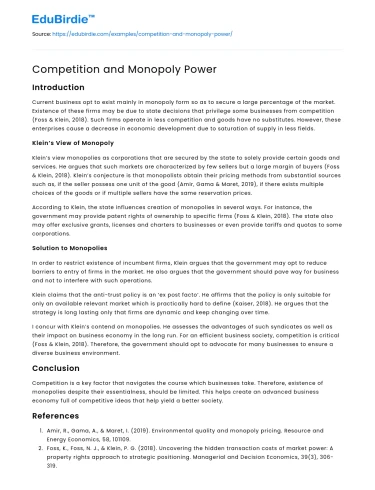Introduction
Current business opt to exist mainly in monopoly form so as to secure a large percentage of the market. Existence of these firms may be due to state decisions that privilege some businesses from competition (Foss & Klein, 2018). Such firms operate in less competition and goods have no substitutes. However, these enterprises cause a decrease in economic development due to saturation of supply in less fields.
Klein’s View of Monopoly
Klein’s view monopolies as corporations that are secured by the state to solely provide certain goods and services. He argues that such markets are characterized by few sellers but a large margin of buyers (Foss & Klein, 2018). Klein’s conjecture is that monopolists obtain their pricing methods from substantial sources such as, if the seller possess one unit of the good (Amir, Gama & Maret, 2019), if there exists multiple choices of the goods or if multiple sellers have the same reservation prices.
Save your time!
We can take care of your essay
- Proper editing and formatting
- Free revision, title page, and bibliography
- Flexible prices and money-back guarantee
According to Klein, the state influences creation of monopolies in several ways. For instance, the government may provide patent rights of ownership to specific firms (Foss & Klein, 2018). The state also may offer exclusive grants, licenses and charters to businesses or even provide tariffs and quotas to some corporations.
Solution to Monopolies
In order to restrict existence of incumbent firms, Klein argues that the government may opt to reduce barriers to entry of firms in the market. He also argues that the government should pave way for business and not to interfere with such operations.
Klein claims that the anti-trust policy is an ‘ex post facto’. He affirms that the policy is only suitable for only an available relevant market which is practically hard to define (Kaiser, 2018). He argues that the strategy is long lasting only that firms are dynamic and keep changing over time.
I concur with Klein’s contend on monopolies. He assesses the advantages of such syndicates as well as their impact on business economy in the long run. For an efficient business society, competition is critical (Foss & Klein, 2018). Therefore, the government should opt to advocate for many businesses to ensure a diverse business environment.
Conclusion
Competition is a key factor that navigates the course which businesses take. Therefore, existence of monopolies despite their essentialness, should be limited. This helps create an advanced business economy full of competitive ideas that help yield a better society.
References
- Amir, R., Gama, A., & Maret, I. (2019). Environmental quality and monopoly pricing. Resource and Energy Economics, 58, 101109.
- Foss, K., Foss, N. J., & Klein, P. G. (2018). Uncovering the hidden transaction costs of market power: A property rights approach to strategic positioning. Managerial and Decision Economics, 39(3), 306-319.
- Kaiser, B. (2018). Antitrust and Regulation in American Economic History. The Oxford Handbook of American Economic History, 2, 325.






 Stuck on your essay?
Stuck on your essay?

